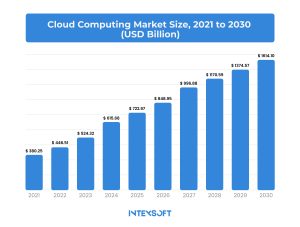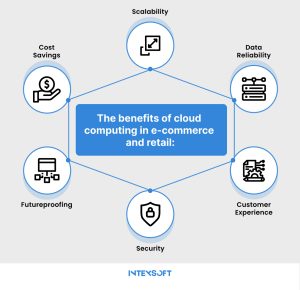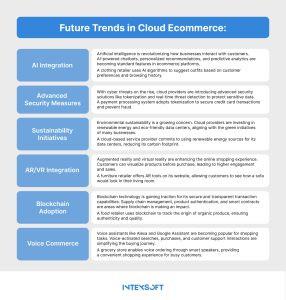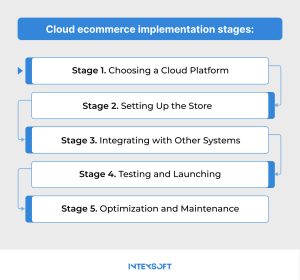
Are you looking for ways to revolutionize your online store? In this article, you will explore all the essentials of cloud computing: its types, top examples, benefits, and implementation practices. Learn these step by step. Need more answers or tailored tips? Contact our experts.
Reading time: 19 min.
Today, the truth is that nearly every business relies on the cloud in some capacity. Between 2010 and 2020, this technology took the world market by storm, surging from $24.63 billion to $156.4 billion, marking an impressive 635% increase. It’s not a recent trend but a viral solution used everywhere, including in the ecommerce field.
Take, for instance, a retail company that uses ecommerce cloud storage to manage its inventory data or a software firm that utilizes cloud servers to host its applications.
Cloud networking stands out for its scalability and flexibility, allowing organizations to expand their infrastructure in response to shifting demands. Consider an online retailer that can swiftly increase server capacity during a holiday sale to handle the surge in traffic.
This adaptability meets operational needs and cuts costs—companies pay only for the services they use. A small business might start with a basic package and scale up as it grows.
In this article, IntexSoft explores ecommerce cloud solutions, its various types, and the benefits they offer online stores of any scale.
Cloud computing is like having a virtual IT powerhouse at your fingertips. Imagine accessing everything from storage and databases to servers and software, all through the internet. It offers scalability improvements, adaptability, and economic advantages without the headaches of managing physical infrastructure.
So, it is easy to believe the following predictions: By the year 2028, experts anticipate that the global cloud computing market will surpass $1 trillion in worth.


Instead of dealing with the cumbersome and expensive process of purchasing and managing physical infrastructure, stores can now adjust their resources with remarkable speed and efficiency.
Consider an online retailer facing the annual onslaught of Black Friday shoppers. In the past, they might have struggled with overwhelmed servers and lost sales. With cloud computing, they can ramp up server capacity to handle the surge in traffic and sales seamlessly. The same goes for a subscription service during off-peak times—they can scale down resources, saving significant costs.
Take a store planning a flash sale. Anticipating a surge in traffic, they can instantly boost their server capacity to ensure a smooth customer experience. This ability to adjust on the fly, without any disruption, is truly worthy.
The bottom line: cloud scalability ensures e-commerce companies can swiftly adapt to changes. This factor helps to win in the long run.
This popular technology excels in redundancy across multiple geographically dispersed data centers, providing a sense of security and peace of mind. The redundancy ensures that data remains always accessible even if one data center encounters an issue. In the event of an outage or hardware failure at one location, redundant copies of data stored elsewhere ensure continuity and accessibility, further enhancing the reliability of the system.
Cloud service providers employ sophisticated technologies (data replication, synchronization, and automated failover) to maintain data consistency and availability. These measures mitigate the risk of data loss or corruption.
Cloud platforms offer comprehensive disaster recovery services, including automated backups and failover mechanisms.
In terms of security, cloud providers implement robust measures such as encryption, access controls, and real-time monitoring to protect data integrity and prevent unauthorized access.
By consolidating customer data within a centralized cloud environment, businesses gain a comprehensive view of browsing habits to purchase histories of your real clients. This wealth of information fuels targeted marketing strategies. You can adjust and readjust personalized product recommendations, and curated content delivery. These all are about engagement and loyalty at full capacity.
Cloud-based AI and machine learning algorithms leverage this data trove to automate tasks. The first in this way are customer segmentation and predictive analytics. What does it mean? AI-driven chatbots deliver instant and relevant support around the clock.
You can leverage real-time data processing. While your competitors are struggling with market shifts and changes in customer demands, facing new challenges, you continue moving forward smoothly. Any changes are not serious problems for you, empowered with cloud computing.
By consolidating customer data within a centralized cloud environment, businesses gain a comprehensive view of their actual clients’ browsing habits and purchase histories. This wealth of information fuels targeted marketing strategies. You can adjust and readjust personalized product recommendations and curated content delivery. These are all about engagement and loyalty at full capacity.
Cloud-based AI and machine learning algorithms leverage this data trove to automate tasks. The first is customer segmentation and predictive analytics. What does it mean? This means that AI-driven chatbots are at your customers’ service, delivering instant and relevant support around the clock and making their experience with your business seamless and convenient.
You can leverage real-time data processing. When your competitors are struggling with market shifts and changes in customer demands, they meet new challenges, but you keep moving forward smoothly. Why? Because any changes are not serious problems for you, empowered with cloud computing.
For ecommerce companies, this tech means peace of mind. Sensitive information, including customers’ payment details, is well-protected. During high-stakes periods, when cyberattacks are more frequent, these advanced security measures ensure that data remains safe and operations continue without a hitch.
Take Amazon Web Services They offer encryption services that secure data both in transit and at rest. Microsoft Azure adds an extra layer of protection with multi-factor authentication. Google Cloud Platform goes a step further, utilizing machine learning algorithms to detect and respond to security threats in real-time.
Once burdened with the purchase and upkeep of expensive hardware and software, online stores find relief as cloud providers take on the heavy lifting of infrastructure management. This pay-as-you-go model means businesses only incur costs for the resources they actually use.
Consider an online retailer: rather than investing in physical servers to store inventory data, they can now rely on scalable cloud solutions. This flexibility allows them to adjust their usage in response to market demand, ramping up during peak seasons and scaling back when business is slower.
The second factor to consider is that cloud computing minimizes the necessity for a large internal IT staff. With its expertise in managing and securing data, the cloud provider shoulders these responsibilities. For a tech startup, this means focusing resources on product development.
Regular updates and maintenance come bundled with cloud services, alleviating businesses from the additional costs of keeping systems current. Take, for instance, a company utilizing cloud-based accounting software. They receive the latest features and security enhancements.
This is the last point, but it is no less critical. These technologies are essential to a successful future for online stores. They offer multiple possibilities to consider. Ecommerce companies can effortlessly integrate AI-powered chatbots, resulting in enhanced customer service. You can also deploy machine learning algorithms to analyze customer behavior and improve personalized recommendations. Online analytics tools powered by the cloud strengthen businesses of all kinds and help them derive meaningful understandings of market patterns and customer inclinations. This enables business owners and C-level executives to apply data findings to decision processes.
Let’s learn more about the types of architectural models for cloud services available for every online store owner. The table below captures the essence of each model’s benefits and provides transparent, relatable examples.
| Model | What does it mean? | Typical examples | Why is it worth implementation? |
| Software as a Service | This type is revolutionizing the ecommerce landscape by distributing software products online with subscription-based pricing.. From CRM tools to email marketing platforms, and even entire ecommerce setups like Shopify and Magento, this model eliminates the headache of software maintenance and lets businesses zero in on their core activities. | Salesforce, Mailchimp, BigCommerce, WooCommerce. | Frees online stores from the burdens of software maintenance, allowing them to concentrate on what they do best. |
| Infrastructure as a Service | This is the backbone of cloud IT, offering fundamental infrastructure elements on a pay-as-you-go basis. This flexibility supports the scalable development of e-commerce ventures, allowing them to allocate resources in response to fluctuating demands without hefty capital outlays. | Amazon Web Services, Google Compute Engine, Microsoft Azure. | It provides scalable resources, eliminating the requirement for large upfront capital and enabling agile responses to market changes. |
| Platform as a Service | The technology offers a streamlined approach for developers by providing a cloud-based platform and environment for creating applications and services. This model is ideal for those who want to develop, operate, and control applications without the burden of managing the intricate infrastructure below them. | Microsoft Azure App Service, AWS Elastic Beanstalk. | Simplifies development workflows, accelerates deployment, and enhances team collaboration, fostering innovation and efficiency. |
Looking ahead, several key trends are shaping the future of cloud-based ecommerce solutions:

A multitude of cloud providers beckon, each boasting its own arsenal of unique features and benefits. So, selecting the most beneficial for a specific online store can be a challenging task.
Here’s a glimpse into some of the top SaaS providers reigning in the cloud:
As the epitome of user-friendliness and functionality, this platform is a powerhouse in the ecommerce world. There are several factors why it has become reality. The first reason is that a seamless interface and robust toolset empower businesses to scale effortlessly, manage products efficiently, and handle transactions securely. The next truly worthy reason is a vast array of integrations and add-ons that Shopify offer. Provider guarantee that your online store is always ahead of the curve.
Magento’s reputation for adaptability and scalability makes it a genuinely worthy choice for online stores looking to expand their operations and gain a competitive advantage. Why? It offers customizable features and strong management capabilities that cater to a wide range of needs. The great news is that this platform is very well-suited for both startups and established enterprises. With a global presence of over 250,000 merchants and a dedicated developer community, Magento’s proven track record and ongoing innovation prove its leadership in the digital commerce space. And do it confidently.
Leveraging the dynamic capabilities of WordPress, WooCommerce empowers business leaders and executives with flexibility and functionality. It simplifies critical tasks (inventory management and payment processing), providing the tools needed to enhance customer interactions and customize the ecommerce platform to meet precise business demands. Integrating third-party plugins for marketing enhancements, deploying advanced analytics for data-driven strategies, and implementing customer loyalty programs for improved retention are some examples of how each online store can create a tailored and efficient online shopping journey.
This platform, part of the Salesforce ecosystem, revolutionizes ecommerce by integrating seamlessly with Salesforce’s cloud applications. It optimizes sales, marketing, and customer relations through advanced analytics and robust features. This integration enables tailor-made marketing activities and individualized experiences based on customer data. The Commerce Cloud’s AI-powered insights improve inventory management and operational efficiency. Its scalability supports global expansion and ensures a seamless shopping experience across devices.
How to move ecommerce stack to cloud?

The initial step is to choose the appropriate cloud ecommerce solution for your business goals. However, it is not as simple as it may seem at first glance. There are almost unlimited amounts of players, and what works great for direct competitors may not always be suitable for your store. First of all, you should consider cost, features, user-friendliness, and scalability when selecting.
What are leaders? In this way, we can emphasize the six most attractive ones. To help you in selecting, let’s highlight one dominating feature of each individually.
We appreciate Amazon Web Services for its robust tools. Google Cloud Platform is known for its advanced machine learning capabilities, and Microsoft Azure is a great choice for its smooth integration with Microsoft products. Shopify is recognized for its user-friendly interface, WooCommerce for its flexibility with WordPress, and Magento for its customization.
Now, after selecting your best cloud ecommerce platform, you can move forward to the next phase. We mean creating an account and setting up your store. Select a theme. Shopify’s extensive template library is a prime example. Then, add products by uploading images and descriptions as seen in WooCommerce, configuring payment options, and customizing store settings such as tax and shipping rules.
If your business already uses systems like a CRM or ERP, integration with your eCommerce platform is crucial. This ensures synchronization of your store’s data, maintaining a single source of truth for customer and order information. Consider how integrating Shopify with Salesforce CRM, for instance, can streamline customer management.
Before going live, rigorous testing of your store is essential. This involves functional tests to ensure the checkout process works smoothly and performance tests to confirm the site can handle high traffic. After thorough testing and achieving satisfactory results, you can launch your store and start selling.
Post-launch, ongoing maintenance and performance optimization of your store are vital. Monitor performance with tools like Google Analytics, address issues like slow page load times promptly, and continuously improve elements such as product descriptions to enhance the user experience and drive sales. As your business expands, upgrading your platform—like moving to a higher-tier plan on Shopify or adding server capacity on AWS—will ensure it can handle increasing traffic and transactions, especially during peak shopping seasons.
This technology has reshaped how companies operate. Ecommerce, in particular, has seen significant benefits. For small and medium-sized online stores, the cloud offers a quicker way to complete tasks, scale operations, and manage vast amounts of data. All of these are more cost-effective than traditional methods.
Nearly every business leverages cloud computing. It’s actually for sharing documents or hosting customer-facing web applications.
Online retailers can utilize cloud-based inventory management systems and monitor stock levels around the clock, enhancing efficiency. As companies start employing cloud-based CRM systems, handling customer interactions will become smooth.
If you decide to use cloud technologies in the ecommerce sector, contact IntexSoft anytime. Our seasoned experts are always here to empower your store with rich expertise.